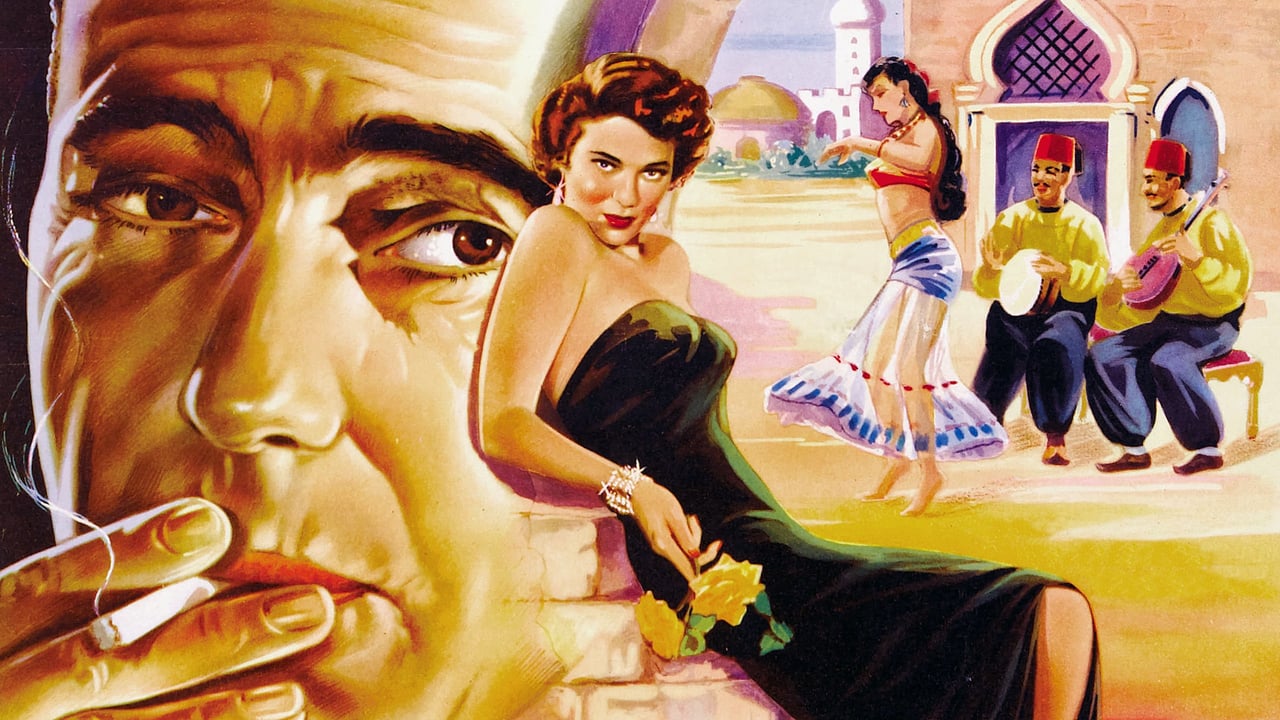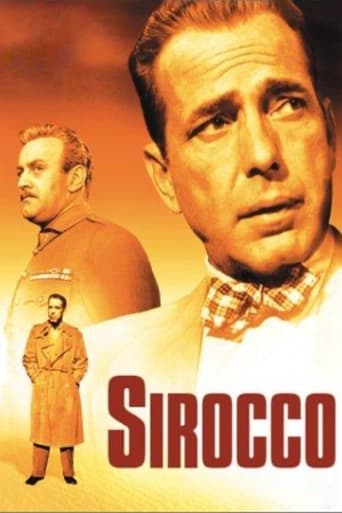

Just perfect...
... View MoreThis film is so real. It treats its characters with so much care and sensitivity.
... View MoreThe thing I enjoyed most about the film is the fact that it doesn't shy away from being a super-sized-cliche;
... View MoreThis is a dark and sometimes deeply uncomfortable drama
... View MoreHaving personally known the protagonist in another setting, this movie has a strong grip of realism. No, I did not know Bogie, but worked closely for many years with the type of person he portrays in Sirocco. 60+ years after its making, Sirocco shows us how the world turns. Its emptiness; its senselessness; its ugliness; its cruelty - these are the things we do not want confront. We want to pretend that the characters in the movie could never exist. Yet, they and the undercurrents of war and chaos are the grist of modern day life. That is why you feel uncomfortable when the movie ends. The actions and reactions of the characters are too real. Comparisons with other movies, actors and scripts are attempts to dilute the caustic quality of Sirocco, where everyone loses. This is an excellent tutorial to learn about human behavior in no-win situations.
... View MoreImagine, if actors became unstuck in time, that Charles Laughton had decided to follow up MUTINY ON THE BOUNTY's Bligh with Captain Queeg in THE CAINE MUTINY. Imagine Laurence Olivier had decided to top HAMLET with Travis Bickle in TAXI DRIVER. Imagine Marlon Brando had decided to follow his GODFATHER role with the title character in SCARFACE. Imagine Edward G. Robinson had taken the lead role in LITTLE NICKY to follow up LITTLE CAESAR. Imagine Robert de Niro trying to encore RAGING BULL with TIN CUP's Kevin Costner role. If you can picture any of these career missteps, you will get a good idea of how Humphrey Bogart soiled his portrayal of high-class slime-ball Rick in 1942's best picture, CASABLANCA, with his one-note unintentional spoof as "Harry Smith" that he phoned in on SIROCCO nine years later. Since Martha Toren as lone love interest Violette can't hold a candle to Ingrid Bergman's portrayal of Ilsa Lund in the earlier film, about the only redeeming grace in this 1951 misfire is the complex portrayal of relatively humane if fatalistic French Col. Feroud by Lee J. Cobb.
... View MoreWell, after reading the first 3 pages of comments, I can't believe anyone made it this far, but if you did, here is what I have to say...."Sirocco" is a complete waste of time , unless you can learn what not to do in a film. dull and drift-less from the first scene, "Sirocco" literally BLOWS, right out of the theatre. A complete waste of talent, and paper for the scripts, Bogart, Cobb, Sloane Corey, Mostel,Mohr can't make this clunker work, WOW ! I can't believe I wrote that, but it is a FACT.Aimless in its direction, Curtis Bernhardt(Director) , doesn't deserve to get paid for this sch-mucky remake attempt of "Casablanca."He doesn't know how to blend romance with drama or action, I guess he read the script ?, and didn't know how to make dramatic changes. Violette(Marta Toren) is the Ingrid Berman clone, and a very light clone at that. While lovely to the eye, she lacks the depth or skill in acting to create any chemistry between her and Bogey, incredible.As I stated previously, this is how NOT to make a film, and just about anyone can these days. People are often confused if this movie was filmed in the bazaar or the catacombs, it should have been filmed in the dark, and kept there ! I gave this film 3 stars , just for the cast, a negative 10 for the script. Note: for future screen writers, use this a template to build against, maybe you can reedit the film to have some dramatic tension, or rewrite scenes that would build to a climax, just not the veritable collapse that it currently does.All in all, Bogart should have saved his money, and credibility.
... View MoreSirocco was one of those independent productions that Humphrey Bogart's Santana productions did for Columbia Pictures after Bogey's long term contract with Warner Brothers expired. Bogey had a mixed record of success and Sirocco didn't exactly set the movie world on fire.The story takes place in Damascus after World War I with the French given a mandate by the League of Nations over the former Ottoman Empire territory of Syria and the Syrians not really too crazy about it. They've got a guerrilla war going against them and it is being led by Onslow Stevens as Moulay Hassan.The French occupying troops are led by General Everett Sloane with Lee J. Cobb as the Colonel in charge of intelligence. They're having no luck even trying for a cease fire. And there's a lovely black market in weapons being sold to the Syrians.Which is where soldier of fortune Humphrey Bogart comes in. Bogey is at his most cynical here, too cynical probably to get a real rooting interest from the audience. He really has no inner core of decency that was apparent in Casablanca to which this film bears a superficial resemblance.The Ingrid Bergman character is played by another Swedish actress Marta Toren who is Lee J. Cobb's girlfriend. Can you imagine Elsa Lund as a selfish slattern, than you've got what Toren is. Somehow her domestic problems also and fling with Bogart also don't arouse the audiences interest.There are some good performances from supporting players like Zero Mostel, Nick Dennis, and Ludwig Donath as various Arabic types. You will enjoy them.But I would also have to say that Sirocco takes place at a time when certain movements and issues were coming to the fore. Great questions were being raised and Sirocco answers none of them.
... View More